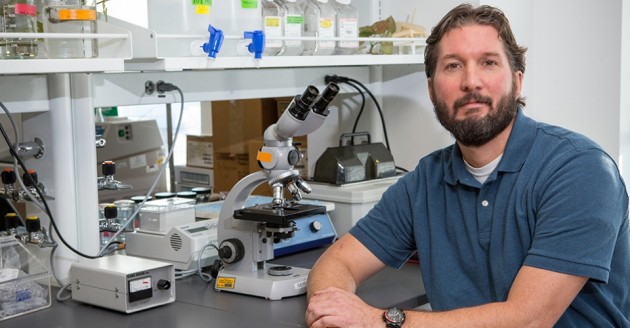Stewards of the Visual Exposition
Delicate Balance
Publisher's note: The author of this post, Jules Norwood, is a contributor to ECU News Services.
Throughout a decades-long reproductive lifespan, the human male body maintains a delicate balance related to sperm production that has direct public health implications related to both infertility and testicular cancer.
And a research team at East Carolina University has received a $438,076 grant from the National Institutes of Health (NIH) to continue studying the mechanisms by which that balance is maintained.
"My lab studies spermatogenesis, the process that results in the production of sperm," explained Dr. Christopher Geyer, assistant professor in the Brody School of Medicine's Department of Anatomy and Cell Biology, who is spearheading the research.
"The body maintains a balance of spermatogenic cells, some retaining stem cell potential and others on their way to becoming sperm cells," Geyer said. "These stem cells are what make men fertile for most of their lives. We're working to further the understanding of gene regulation and the manner in which disruption of the normal pattern can lead to abnormalities, including infertility and testicular cancer."
Men have become fathers as young as 11 years old, and others have fathered children in their 90s. By contrast, women begin their lives with a finite supply of egg cells, and fertility declines in the 30s and 40s.
"The consistent production of sperm is ensured by this stem cell supply, and there has to be a balance between maintaining this supply and producing this huge number of cells that will become sperm. The body produces something like 1,000 sperm per heartbeat," Geyer said.
The stem cells retain the potential to develop into different types of cells. The research project focuses on the processes by which some cells begin the process of becoming sperm, while others remain as stem cells. The balance is vital, he added, because if the cells divide out of control, it can lead to testicular cancer; too far in the other direction results in infertility.
"We really understand very little about the processes by which these cell fate decisions are made," Geyer said. His team is studying the role of retinoic acid in the process and working to identify the critical requirements for differentiation and sperm production to take place.
"Approximately 10 percent of American couples have fertility issues, and about half of that is on the male side. And that has been increasing over the last few decades," Geyer said. "Understanding these processes will hopefully help us slow that decline."
Department chair Dr. Cheryl Knudson said Geyer's research is important for several reasons, not the least of which is the potential impact on public health.
"This NIH grant will contribute to the mission of ECU by strengthening biomedical research here at the Brody School of Medicine and providing students the opportunity to be involved in a stimulating research project," she added.
The grant, administered by the Eunice Kennedy Shriver National Institute of Child Health and Human Development, is a renewal of a three-year, $432,837 grant awarded in 2012.
Geyer came to ECU in 2010 after a postdoctoral fellowship at the National Institute of Environmental Health Sciences.
NIH is a federal agency that seeks to enhance health, lengthen life and reduce illness and disability by investing in medical research. In 2015 the associated institutes awarded more than $20 billion in research grants. The NIH database currently shows 37 research projects at ECU funded by active grants.

Dr. Christopher Geyer and his team at the Brody School of Medicine are researching the earliest stages of the male reproductive process. The results of the project could significantly advance understanding of how fertility is maintained throughout the male reproductive lifespan.
Go Back
Research targets sperm cell development
Throughout a decades-long reproductive lifespan, the human male body maintains a delicate balance related to sperm production that has direct public health implications related to both infertility and testicular cancer.
And a research team at East Carolina University has received a $438,076 grant from the National Institutes of Health (NIH) to continue studying the mechanisms by which that balance is maintained.
"My lab studies spermatogenesis, the process that results in the production of sperm," explained Dr. Christopher Geyer, assistant professor in the Brody School of Medicine's Department of Anatomy and Cell Biology, who is spearheading the research.
"The body maintains a balance of spermatogenic cells, some retaining stem cell potential and others on their way to becoming sperm cells," Geyer said. "These stem cells are what make men fertile for most of their lives. We're working to further the understanding of gene regulation and the manner in which disruption of the normal pattern can lead to abnormalities, including infertility and testicular cancer."
Men have become fathers as young as 11 years old, and others have fathered children in their 90s. By contrast, women begin their lives with a finite supply of egg cells, and fertility declines in the 30s and 40s.
"The consistent production of sperm is ensured by this stem cell supply, and there has to be a balance between maintaining this supply and producing this huge number of cells that will become sperm. The body produces something like 1,000 sperm per heartbeat," Geyer said.
The stem cells retain the potential to develop into different types of cells. The research project focuses on the processes by which some cells begin the process of becoming sperm, while others remain as stem cells. The balance is vital, he added, because if the cells divide out of control, it can lead to testicular cancer; too far in the other direction results in infertility.
"We really understand very little about the processes by which these cell fate decisions are made," Geyer said. His team is studying the role of retinoic acid in the process and working to identify the critical requirements for differentiation and sperm production to take place.
"Approximately 10 percent of American couples have fertility issues, and about half of that is on the male side. And that has been increasing over the last few decades," Geyer said. "Understanding these processes will hopefully help us slow that decline."
Department chair Dr. Cheryl Knudson said Geyer's research is important for several reasons, not the least of which is the potential impact on public health.
"This NIH grant will contribute to the mission of ECU by strengthening biomedical research here at the Brody School of Medicine and providing students the opportunity to be involved in a stimulating research project," she added.
The grant, administered by the Eunice Kennedy Shriver National Institute of Child Health and Human Development, is a renewal of a three-year, $432,837 grant awarded in 2012.
Geyer came to ECU in 2010 after a postdoctoral fellowship at the National Institute of Environmental Health Sciences.
NIH is a federal agency that seeks to enhance health, lengthen life and reduce illness and disability by investing in medical research. In 2015 the associated institutes awarded more than $20 billion in research grants. The NIH database currently shows 37 research projects at ECU funded by active grants.

Dr. Christopher Geyer and his team at the Brody School of Medicine are researching the earliest stages of the male reproductive process. The results of the project could significantly advance understanding of how fertility is maintained throughout the male reproductive lifespan.
| Reflecting History | East Carolina University, School News, The Region, Neighboring Counties | Ribbon Cutting, Open House to highlight BCCC’s Washington County Center |
Latest Neighboring Counties
|
Republicans Bokhari and Driggs retain seats on city council.
Published: Tuesday, March 26th, 2024 @ 12:50 am
By: Carolina Journal
|
|
Members of the North Carolina Rural Health Association (NCRHA) visited Washington, D.C., on Feb. 14, 2024, to meet with elected officials and advocate for policies to improve access to care in rural areas.
Published: Wednesday, February 28th, 2024 @ 12:51 am
By: Eastern NC NOW Staff
|
|
The US Supreme Court will not take the case of Virginia-based owners of a Dare County beach home who challenged the county's COVID-related shutdown in 2020.
Published: Tuesday, February 6th, 2024 @ 10:14 pm
By: Carolina Journal
|
|
The North Carolina State Fair is set for the Raleigh state fairgrounds from October 12-22, 2023
Published: Friday, February 2nd, 2024 @ 9:01 am
By: Carolina Journal
|
|
A $2.5-billion-dollar bond referendum is slated to be placed on the November ballot this year, as Charlotte-Mecklenburg Schools (CMS) looks for support to fund 30 different projects in the school district.
Published: Sunday, January 14th, 2024 @ 10:08 am
By: Carolina Journal
|
|
Five Asheville-area residents are suing the city in federal court for refusing to appoint them to the local Human Relations Commission. The residents claim they were rejected because they are white.
Published: Saturday, December 9th, 2023 @ 11:53 am
By: Carolina Journal
|
|
Federal grant expands midwifery care for North Carolina
Published: Wednesday, November 29th, 2023 @ 2:59 pm
By: ECU News Services
|
|
Pirates achieve historic sponsored activities funding
Published: Tuesday, November 28th, 2023 @ 10:03 am
By: ECU News Services
|
|
Innovative new MBA pathway provides leadership experiences for students, companies
Published: Saturday, November 18th, 2023 @ 10:42 am
By: ECU News Services
|
|
Program immerses educators in conflict history, culture
Published: Friday, November 17th, 2023 @ 1:03 pm
By: ECU News Services
|
|
5,400 students descend on campus for the new academic year
Published: Wednesday, November 15th, 2023 @ 12:05 am
By: ECU News Services
|
|
ECU undergrads find guidance in SECU Public Fellows Internship program
Published: Tuesday, November 14th, 2023 @ 12:59 am
By: ECU News Services
|
|
Psychology major inspired by role in data internship
Published: Monday, November 13th, 2023 @ 7:57 am
By: ECU News Services
|
























